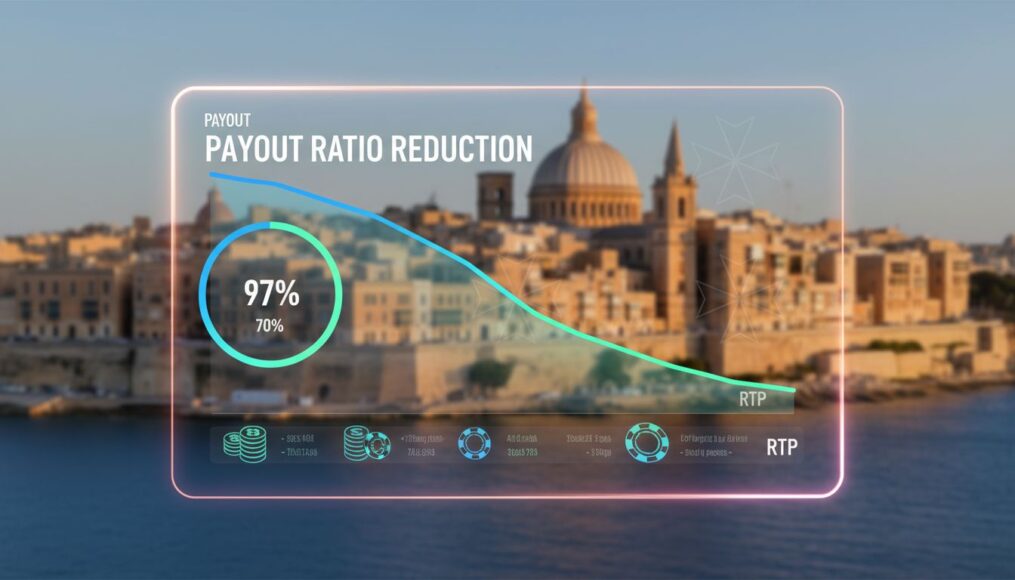Malta’s Way of Reducing the Payout Ratio

The landscape of online gambling across Europe is characterized by widespread legality, accompanied by a robust framework of regulations. While this provides a structured environment for both players and operators, it also introduces complexities. A significant discussion point that has emerged involves a proposed change by the Malta Gaming Authority (MGA) to potentially reduce the payout ratio (Return to Player, or RTP) for online casinos.
This potential shift has sparked considerable debate within the iGaming community, raising questions about its implications for player experience, operator profitability, and the overall competitive balance between different segments of the gambling industry. Understanding the motivations behind such a proposal and its potential ramifications is key to grasping the evolving nature of online gambling regulation.
The Financial Realities Driving Regulatory Considerations
Operating a legal online gambling platform in a regulated market comes with substantial financial commitments. The process of legalization, while beneficial for consumer protection and market stability, introduces a range of costs that operators must absorb. These expenses are often cited as a primary reason for considering adjustments to operational models, including payout ratios.
High Costs of Licensing and Compliance
Regulators across Europe impose significant fees to cover the administrative costs associated with issuing and maintaining licenses. Beyond these initial fees, operators are also required to invest heavily in technical infrastructure and software modifications to ensure continuous compliance with evolving legislative demands. For instance, some jurisdictions mandate specific data reporting systems, responsible gambling tools, or age verification protocols that require considerable development and maintenance.
Furthermore, gambling taxes represent a substantial ongoing cost. These taxes can vary dramatically from one country to another, and crucially, they are often calculated on the stakes wagered rather than just the operator's net profit. This model means that even if an operator experiences a period of lower player activity, the tax burden remains high relative to the turnover. Such high operational costs, including licensing, technical compliance, and taxes, put pressure on operators to find ways to maintain profitability, with adjusting the payout ratio being one potential avenue.
Addressing the RTP Disparity Between Online and Land-Based Casinos
Another key argument put forth by the Malta Gaming Authority for a potential reduction in online casino RTP relates to the perceived imbalance between the payout ratios offered by traditional land-based casinos and their online counterparts. Historically, online casinos have been able to offer higher RTPs due to lower overheads, such as physical premises, staff, and maintenance.
The MGA has highlighted that the higher payout ratios typically found at online casinos (often around 92% or higher) contribute significantly to their popularity. In contrast, land-based casinos, with their higher operational costs, generally offer lower RTPs. The proposal suggests that by bringing online RTPs closer to those of brick-and-mortar establishments, perhaps down to 85%, a more level playing field could be created, fostering fairer competition across the entire gambling sector.
While this move aims to achieve competitive equity, it would inevitably mean a substantially smaller potential return for players. The MGA's commentary also suggests that online casinos could retain some flexibility, allowing them to adjust their RTPs in response to market competition. The underlying idea is that if all licensed operators adhere to a similar range of payout odds, it would prevent a race to the bottom or a situation where only casinos offering the highest RTPs thrive, potentially at the expense of others.
Industry Reactions and Future Outlook
Unsurprisingly, the MGA's proposal has met with a mixed reception, generating both strong opposition and some unexpected support from various stakeholders within the iGaming industry as of 2025.
Concerns Over Player Migration to Unregulated Markets
A primary concern voiced by many critics, including player advocacy groups and some industry experts, is the potential for players to migrate to unregulated, unlicensed gambling sites. These offshore operators are not bound by the same stringent regulations, licensing fees, or tax obligations. Consequently, they can afford to offer significantly higher payout ratios, making them an attractive, albeit riskier, alternative for players seeking better returns.
Such a migration would not only undermine the MGA's efforts to create a fairer regulated market but also expose players to platforms that lack consumer protection, responsible gambling tools, and secure payment processing. This outcome would be counterproductive to the core principles of regulated gambling, which prioritize player safety and integrity.
Support from Operators and the Path Forward
Despite the widespread apprehension, some industry companies and even a segment of players and experts have expressed agreement with the proposed RTP reduction. For operators, a lower payout ratio could help offset the ever-increasing costs of compliance, licensing, and taxation, as initially envisioned by the MGA. This perspective views the adjustment as a necessary measure to ensure the long-term sustainability of licensed online gambling businesses.
As of early 2025, the proposed changes to the payout ratio are still under consideration and have not been immediately implemented. Regulatory processes often involve extensive consultations, impact assessments, and public feedback periods. It is likely that any significant shift in policy by the Malta Gaming Authority would be introduced gradually, allowing operators to adapt and the market to adjust. The ongoing debate highlights the complex balancing act regulators face in fostering a competitive, sustainable, and player-safe online gambling environment.
Most Recent News
Get the latest information








